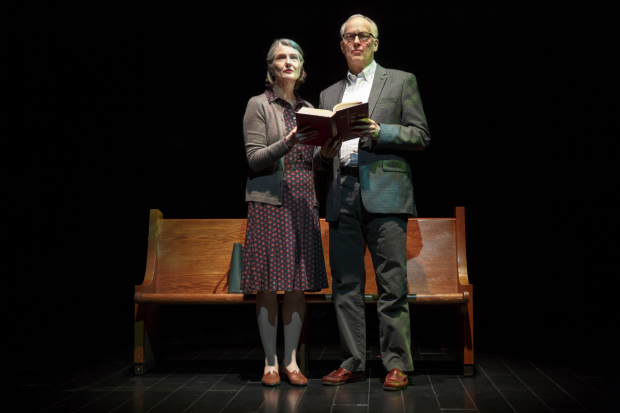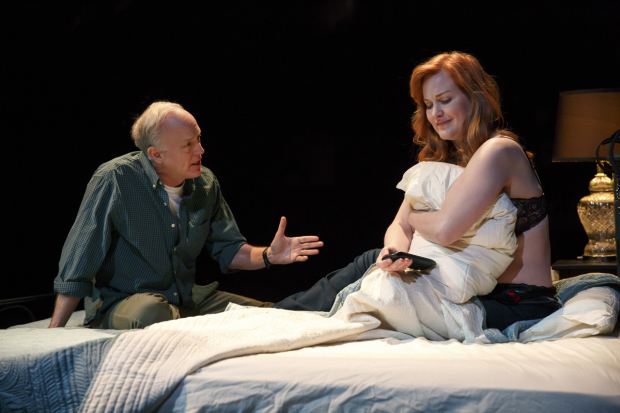
(© Joan Marcus)
It has become cliché to proclaim a desire to regret things done rather than things not done, but that sentiment comes alive beyond trite YOLO culture in Tracy Letts' Man From Nebraska, now finally making its New York debut at Second Stage Theatre following its 2003 premiere with Chicago's Steppenwolf Theatre Company. The play is a sensitive look at the limited time we have on earth and how that time is governed by the constant struggle between obligation and desire.
The man in question is Ken (Reed Birney), an insurance agent who lives with his wife, Nancy (Annette O'Toole), in Lincoln. On Sundays they drive to church, eat at a cafeteria, and go home to watch television, rarely ever speaking. They are chattiest when they visit Ken's mom, Cammie (the frighteningly vacant Kathleen Peirce), at her nursing home. They tell her about their daughter at Brown University, to which Cammie responds, "Gimme some ham."
Good Baptists all, these people are living for the next world, something that becomes a huge problem once Ken admits that he no longer believes in God or an afterlife. Reverend Todd (William Ragsdale) recommends Ken take a vacation to recharge his faith. He decides to fly off to London, where he was stationed during his Air Force days. On the trip he meets randy business traveler Pat Monday (a perky and assertive Heidi Armbruster), hotel bartender Tamyra (an ultracool Nana Mensah), and sculptor Harry (Max Gordon Moore, swimming in Oxfordian smugness). All three expose him to new experiences that pull him way out of his comfort zone, a feeling that Ken increasingly craves.

(© Joan Marcus)
Letts wrote Man From Nebraska four years before his breakout hit, August: Osage County. Both plays feature men from the American heartland whose wanderlust has a deleterious effect on their families, but while Beverly (the patriarch in August) disappears within the first several minutes of that play, Ken sticks around to let us see his inner world.
Granted, we have to read between the lines: As played by Birney, Ken is a man with an almost unflinching poker face, an emotional sublimation that can only come from a lifetime of dedicated practice in the American Midwest. Even when his feelings do spill over, it takes the form of him weeping into a washcloth in the bathroom, lest he rudely wake his sleeping wife. The one time he seems truly unrestrained and joyful is when he is rolling on the dance floor with Harry and Tamyra, but this drug-induced euphoria quickly fades. Birney encases Ken in a cordial falseness, so that we are never quite certain that he means what he says, a trait that has fascinating implications for the end of the play.

(© Joan Marcus)
O'Toole is similarly reserved, but increasingly lets her guard down after Ken's holiday extends several weeks. We feel Nancy's desperation as she watches Cammie wheeze to the increasingly oppressive ambient noise of Pat Sajak's voice on the television. Marriage is a contract and she's holding up her end of the deal, so why can't Ken?
Since it jumps across time zones, Man From Nebraska has a particularly cinematic feel, with little consideration for the economics of the theater. Bit characters like Reverend Todd's horny old dad, Bud (Tom Bloom, perfectly conveying effortless entitlement), make a big splash in their scenes, but are mostly absent from the rest of the story. As he showed in his gorgeous production of The Band's Visit, director David Cromer is brilliant at translating cinematic source material to the stage and this show is no exception.
Cromer and set designer Takeshi Kata address the problem of having few scenes take place in the same room by putting every set piece onstage. These items haunt Ken throughout his journey, the physical evidence of his life in Nebraska. Lighting designer Keith Parham isolates most scenes in their own illuminated circle, making the characters' interactions feel small and insignificant compared to the big, wide world. A stunning backdrop of a cloudy sky reinforces this feeling. God may not exist, but Ken cannot deny that there are things bigger than him in this world.
Cromer has opted to direct this relatively new play as a period piece (a blaring television informs us that Christina Aguilera is on tour with Justin Timberlake, so it must be 2003), which smartly grounds the story in a time when American dominance of the globe seemed more inevitable and unending. Daniel Kluger builds a soundscape of white noise that occupies the void left by Ken and Nancy's silence. It occasionally underlines the absurdity of their comfortable middle-class lifestyle, one that is nearly unprecedented in the history of human existence: As they quietly dig into their steaks, a Muzak piano arrangement of "A Whole New World" from Aladdin plays in the background. This is the American dream, the happily-ever-after that so many people around the world would kill for — and Ken is still miserable.

(© Joan Marcus)
A combination of Letts' astute writing and Birney's sympathetic performance never allows us to completely discount his feelings, mired in privilege though they may be. Spiritually, Ken may be a better artist than insurance salesman, but he chose the road more traveled, and it is very hard to turn back on that after journeying for so long. Man From Nebraska doesn't argue for a world without insurance agents, but it does suggest that before making a lifelong commitment to stability, one really ought to take a gap year.











